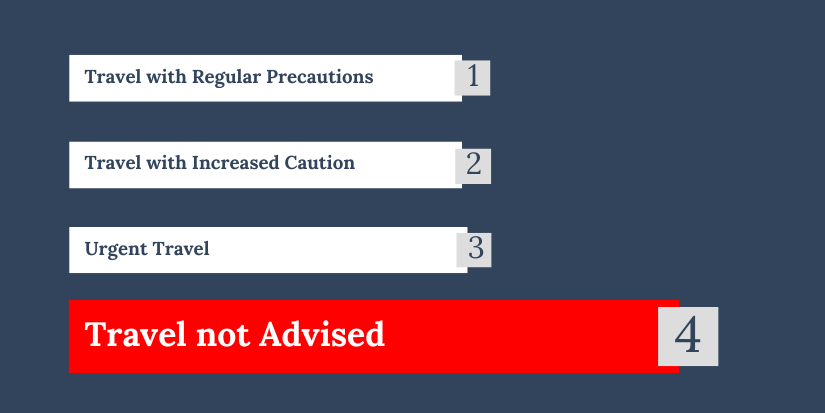
VISA REGIME
For holders of national passports and other travel documents: Visa required
For holders of diplomatic and official passports: Visa required
Note: Holders of an emergency travel document in transit require a visa
ENTERING AND LEAVING THE COUNTRY
A visa, which can be obtained at the Embassy of DR Congo in Belgrade, is required to enter the country, along with a health certificate (yellow card on vaccination). When leaving the country from the Ndjili International Airport in Kinshasa, an exit airport fee of USD 55 is payable.
SOCIAL SECURITY AGREEMENT
No social security agreement has been signed.
USEFUL INFORMATION
HEALTH SITUATION — Before traveling, it is important to check the current health situation on the World Health Organization (WHO) website, Regional Office for Africa: www.afro.who.int/health-topics.
The DRC is a high-risk area for health due to low living standards and insufficient healthcare organization and prevention, which contribute to the spread of diseases such as cholera, measles, poliomyelitis, amoebiasis, and sporadically yellow fever and Ebola. There is also a significant risk of contracting malaria. It is advised to follow strict hygiene measures, wash hands regularly, avoid consuming undercooked food, and drink only bottled water.
Citizens of Serbia traveling to the DRC are required to carry yellow fever vaccination certificates as proof of immunization, which is administered at the Institute of Tropical Diseases in Belgrade. It is also recommended to get vaccinated against all forms of hepatitis, tetanus, and childhood polio.
The government of the DRC has declared an Ebola outbreak in the health zone of Bula-Pe in Kasaï province.
SECURITY SITUATION — DR Congo is a country with a difficult social and economic situation, and high rates of violence. Several hundred armed groups are active in 10 of the 26 provinces (mainly in the east of the country). Territories under their control are not within the elementary security standards, and militants use the local population as hostages and free labour.
DR Congo consistently ranks last on the GDP per capita index and the human development index. The rate of unemployment of the work-capable population is at 70%, and thus many of the unemployed are involved in criminal activities.There are numerous criminal gangs armed with firearms and machetes in large cities in DR Congo (including Kinshasa), frequently kidnapping foreign nationals for robbery or ransom. Underage persons beg and engage in petty theft. Only the urban part of Kinshasa (Gombe) can be considered relatively safe during the day. Citizens of the Republic of Serbia currently in DR Congo are advised to take additional safety measures, to monitor information in the public media, to comply with instructions issued by the national authorities and to cooperate with the authorities, if necessary.
Planned travel to DR Congo should be shared with family members and friends, and if possible, regular contact with them by telephone or online maintained. Travellers are also advised not to hand over their passport to anyone for safekeeping. They should, instead, keep a copy of their passport and of their visa for DR Congo, along with any other documents, in a safe place.
OTHER — The country is in the area of Central Africa. Two thirds of the territory are south of the equator, where the rainy season lasts from October to early April. The dry season is from April to late September. In the part of the country north of the equator, the seasons are reversed. In the equatorial area itself, the rainy season is constant (daily shifts between rain and sunshine, with air humidity in excess of 90%). During the rainy season, daytime temperatures go up to 36 degrees Celsius, whereas morning temperatures are around 23 degrees Celsius. During the dry season, the maximum daytime temperatures are up to 30 degrees Celsius, whereas morning temperatures are around 18 degrees, without rainfall.
Contact information:
For consular assistance and protection while in DR Congo, please contact the Embassy of the Republic of Serbia in Kinshasa (address: 112, Avenue de 1 Etoile Gombe, Kinshasa, Kongo, DR), at the following telephone numbers: 00 243 97 15 94 988, 00 243 99 10 45 488, or e-mail: serbambakin@gmail.com.
